-
 bitcoin
bitcoin $87959.907984 USD
1.34% -
 ethereum
ethereum $2920.497338 USD
3.04% -
 tether
tether $0.999775 USD
0.00% -
 xrp
xrp $2.237324 USD
8.12% -
 bnb
bnb $860.243768 USD
0.90% -
 solana
solana $138.089498 USD
5.43% -
 usd-coin
usd-coin $0.999807 USD
0.01% -
 tron
tron $0.272801 USD
-1.53% -
 dogecoin
dogecoin $0.150904 USD
2.96% -
 cardano
cardano $0.421635 USD
1.97% -
 hyperliquid
hyperliquid $32.152445 USD
2.23% -
 bitcoin-cash
bitcoin-cash $533.301069 USD
-1.94% -
 chainlink
chainlink $12.953417 USD
2.68% -
 unus-sed-leo
unus-sed-leo $9.535951 USD
0.73% -
 zcash
zcash $521.483386 USD
-2.87%
What does OKX contract mean
OKX Contract enables crypto traders to speculate on cryptocurrency price movements using leverage, advanced order types, and competitive fees, offering opportunities for profit generation, hedging, and passive income.
Nov 12, 2024 at 09:22 pm

OKX Contract refers to a suite of financial instruments offered by the OKX exchange, one of the world's leading cryptocurrency exchanges. These instruments enable traders to speculate on the future price movements of cryptocurrencies without owning the underlying assets.
Key Features of OKX Contract:- Leverage trading: Allows traders to amplify their potential profits and losses by borrowing funds from the exchange.
- Variety of underlying assets: Supports trading on a wide range of cryptocurrencies, including Bitcoin, Ethereum, and Litecoin.
- Advanced trade types: Offers a range of order types, including limit, market, and stop orders, providing traders with flexibility in executing their strategies.
- Competitive fees: Charges low trading fees and margin interest rates, making it accessible for traders of all experience levels.
- Profit from price movements: Speculate on the future direction of cryptocurrency prices to generate profits.
- Hedging against risk: Use contract trading to hedge against existing cryptocurrency holdings and reduce potential losses.
- Earning passive income: Become a market maker or provide liquidity to earn fees from other traders.
- Leverage market insights: Utilize advanced charting tools and technical indicators to make informed trading decisions.
OKX offers two main types of contracts:
- Perpetual Contracts: Expiry-less contracts that settle in USDT, allowing for continuous trading.
- Quarterly and Delivery Contracts: Contracts with predefined expiry dates and settled in the underlying cryptocurrency.
Margin trading involves borrowing funds from the exchange to increase your trading power. Leverage is the ratio of borrowed funds to your own capital. Higher leverage amplifies both profits and losses.
3. Order Types:- Limit Orders: Executed only when the market price reaches a specified limit set by the trader.
- Market Orders: Executed immediately at the best available market price.
- Stop Orders: Triggered only when the market price reaches a certain threshold specified by the trader.
- Stop-Loss Orders: Automatically liquidate your position if the price moves against you, limiting potential losses.
- Position Management: Monitor your open positions to adjust leverage, hedging, or exit strategies as market conditions change.
- Risk-to-Reward Ratio: Determine the potential profit against the potential loss before entering a trade.
- Trading Fees: Charged on each trade as a percentage of the trade value.
- Margin Interest: Charged on borrowed funds when holding a leveraged position.
- Funding Fees: Paid or received when your position's funding rate is positive or negative.
- Scalping: Opening and closing positions quickly for small, frequent profits.
- Day Trading: Holding positions for a few hours or up to a day.
- Swing Trading: Holding positions for several days or weeks to capitalize on market trends.
- Position Trading: Holding positions for long periods, ranging from months to years.
OKX Contract offers a comprehensive suite of financial instruments and features that cater to the needs of both novice and experienced cryptocurrency traders. Understanding the key concepts, benefits, and risks associated with contract trading is essential for successful navigation of this dynamic market.
Disclaimer:info@kdj.com
The information provided is not trading advice. kdj.com does not assume any responsibility for any investments made based on the information provided in this article. Cryptocurrencies are highly volatile and it is highly recommended that you invest with caution after thorough research!
If you believe that the content used on this website infringes your copyright, please contact us immediately (info@kdj.com) and we will delete it promptly.
- BlockDAG's $452M Presale Nears End: The $0.0005 Upside Entry Opportunity for 2026
- 2026-02-03 15:40:02
- IronWallet Revolutionizes Crypto: Multi-chain Wallet, Gasless Transactions, and Privacy-First Security Take Center Stage
- 2026-02-03 15:55:01
- The Epstein Files & Satoshi's Shadow: Emails Exposed, Crypto's Past Reimagined
- 2026-02-03 12:35:01
- BlockDAG's $450M+ Presale Countdown: The 100x Opportunity About to Vanish
- 2026-02-03 12:50:01
- Bitcoin Price Plummets Below Key Thresholds Amid Market Shift: What Investors Need to Know
- 2026-02-03 13:20:01
- SpaceCoin Unveils 10% APR Staking Program, Pioneering Decentralized Satellite Internet
- 2026-02-03 13:20:01
Related knowledge
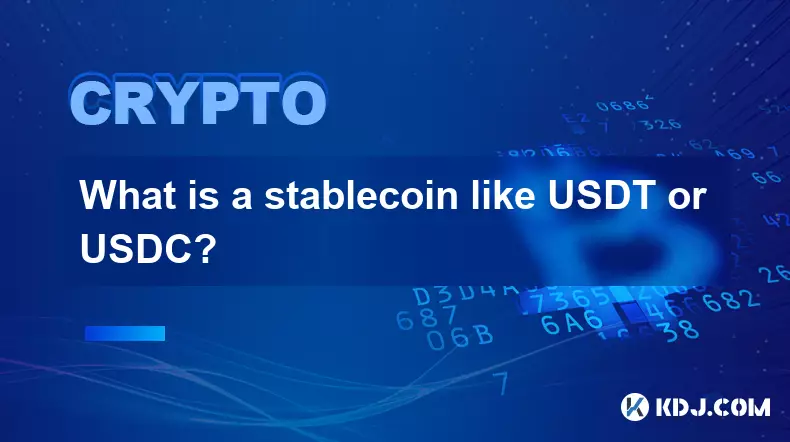
What is a stablecoin like USDT or USDC?
Oct 13,2025 at 03:54am
Understanding Stablecoins in the Cryptocurrency EcosystemStablecoins such as USDT and USDC serve as digital assets designed to maintain a consistent v...
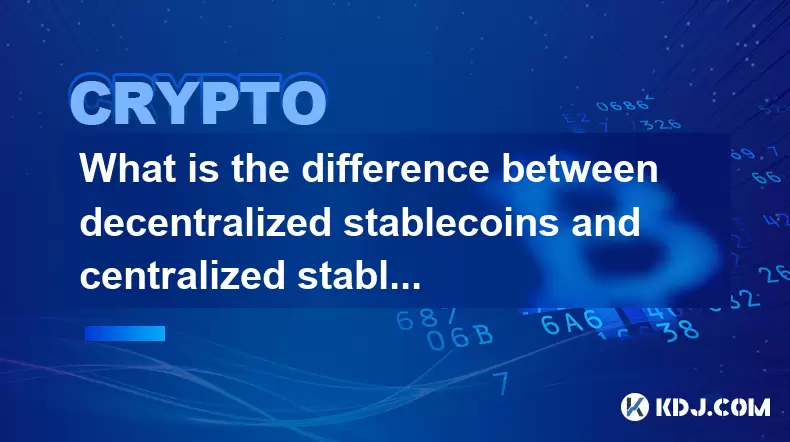
What is the difference between decentralized stablecoins and centralized stablecoins? Pros and cons comparison
Jun 15,2025 at 09:42am
What Are Stablecoins and Why Do They Matter?Stablecoins are a category of cryptocurrencies designed to maintain a stable value, usually pegged to an e...
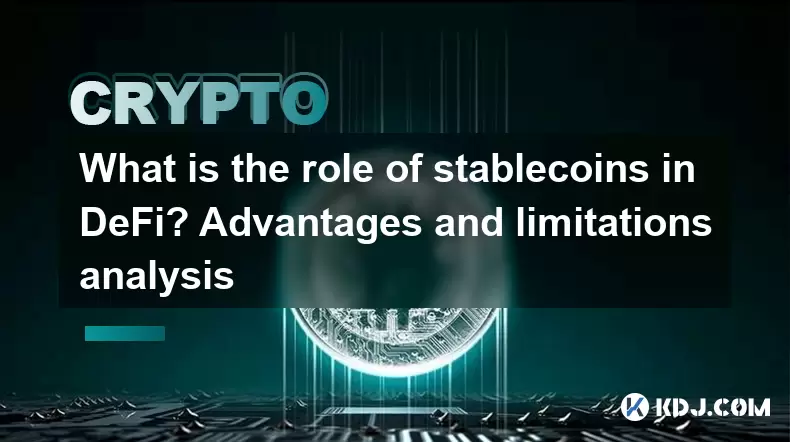
What is the role of stablecoins in DeFi? Advantages and limitations analysis
Jun 14,2025 at 06:28am
Understanding Stablecoins in the DeFi EcosystemStablecoins play a pivotal role in the decentralized finance (DeFi) landscape by providing a bridge bet...

How do algorithmic stablecoins work? Potential risks and market impact
Jun 12,2025 at 02:07pm
Understanding Algorithmic StablecoinsAlgorithmic stablecoins are a type of cryptocurrency designed to maintain a stable value relative to a specific a...
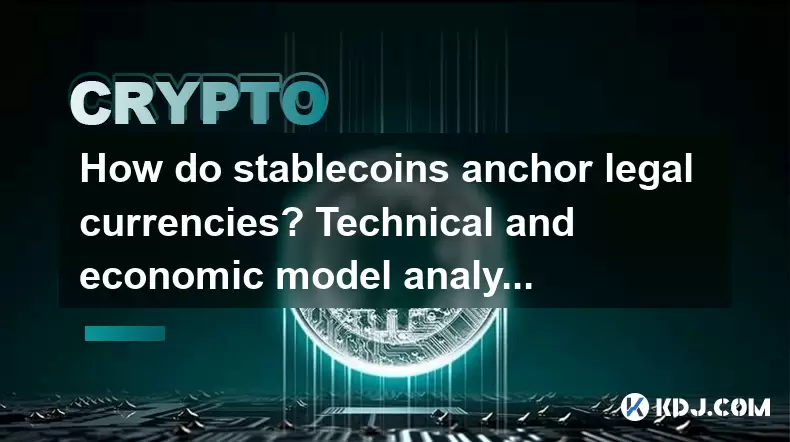
How do stablecoins anchor legal currencies? Technical and economic model analysis
Jun 16,2025 at 08:43am
Understanding the Concept of StablecoinsStablecoins are a category of cryptocurrencies designed to maintain a stable value relative to a specific asse...
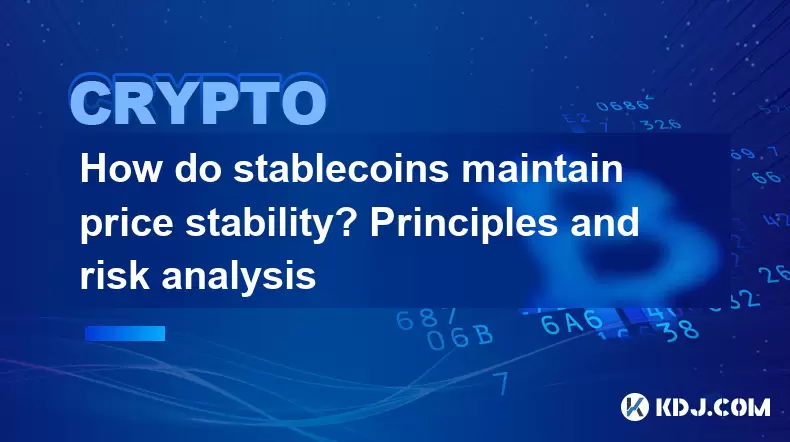
How do stablecoins maintain price stability? Principles and risk analysis
Jun 11,2025 at 12:01am
Understanding the Mechanisms Behind Stablecoin StabilityStablecoins are a category of cryptocurrencies designed to minimize price volatility, often pe...

What is a stablecoin like USDT or USDC?
Oct 13,2025 at 03:54am
Understanding Stablecoins in the Cryptocurrency EcosystemStablecoins such as USDT and USDC serve as digital assets designed to maintain a consistent v...

What is the difference between decentralized stablecoins and centralized stablecoins? Pros and cons comparison
Jun 15,2025 at 09:42am
What Are Stablecoins and Why Do They Matter?Stablecoins are a category of cryptocurrencies designed to maintain a stable value, usually pegged to an e...

What is the role of stablecoins in DeFi? Advantages and limitations analysis
Jun 14,2025 at 06:28am
Understanding Stablecoins in the DeFi EcosystemStablecoins play a pivotal role in the decentralized finance (DeFi) landscape by providing a bridge bet...

How do algorithmic stablecoins work? Potential risks and market impact
Jun 12,2025 at 02:07pm
Understanding Algorithmic StablecoinsAlgorithmic stablecoins are a type of cryptocurrency designed to maintain a stable value relative to a specific a...

How do stablecoins anchor legal currencies? Technical and economic model analysis
Jun 16,2025 at 08:43am
Understanding the Concept of StablecoinsStablecoins are a category of cryptocurrencies designed to maintain a stable value relative to a specific asse...

How do stablecoins maintain price stability? Principles and risk analysis
Jun 11,2025 at 12:01am
Understanding the Mechanisms Behind Stablecoin StabilityStablecoins are a category of cryptocurrencies designed to minimize price volatility, often pe...
See all articles

























![Discontinuum by: ArchitechGD 100% (1 coin) (Mobile) Geometry Dash [2.2] Discontinuum by: ArchitechGD 100% (1 coin) (Mobile) Geometry Dash [2.2]](/uploads/2026/02/03/cryptocurrencies-news/videos/origin_69814d99e6b61_image_500_375.webp)
















































